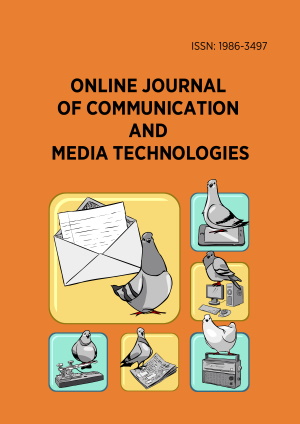Research Article
Relationship between Internet Use and Health Orientation: A Study among University Students
More Detail
1 Manipal University, India* Corresponding Author
Online Journal of Communication and Media Technologies, 5(September 2015 - Special Issue), 2015, 103-113, https://doi.org/10.30935/ojcmt/5693
OPEN ACCESS 1916 Views 1992 Downloads
ABSTRACT
People have three ways to learn about the world, through direct personal experiences, interpersonal interactions and the media. Today through Internet, all three methods are experienced at the same time. Young adults are reluctant to share physical and emotional health queries through interpersonal communication and turn to the Internet as it is seen as a fast and confidential way of getting health information. This study investigates the role Internet on its users health information seeking behaviour in the Indian context. Given that youth in India are the largest segment of Internet users, the study aims to find out if young adults search for health information online and for those who do, does the medium play any role in their health satisfaction. The findings of this research reveal that young adults occasionally search for health information on the Internet and have benefitted from it. The study also reveals that the young adults recognise the importance of health but are not very satisfied with their current health.
CITATION (APA)
Shubha, H. S. (2015). Relationship between Internet Use and Health Orientation: A Study among University Students. Online Journal of Communication and Media Technologies, 5(September 2015 - Special Issue), 103-113. https://doi.org/10.30935/ojcmt/5693
REFERENCES
- Atkinson, N. S. (2009). Using the Internet for health related activities : findings from a national probability sample. Journal of Medical Internet Research.
- Babbie, E. R. (2001). The practice of social research (9th ed.). Belmont, CA: Wadsworth.
- Backer, T. R. (1992). Designing Health Communication Campaigns : what works? Newbury Park, CA: Sage.
- Ball-Rokeach, S. J. (1976). A Dependency model or mass media effects. Communication Research, 3-21.
- Becker, M. E. (1974). the health belief model and personal health behaviour.
- Buckingham, D. (2008). "Introducing Identity." Youth, Identity and Digital Media. Cambridge: The MIT Press.
- CISCO. (2011). CISCO Connected World Technology Report. CISCO.
- Currie, C. e. (2012). Social Determinants of Health and Well Being among young people. Health Behaviour in School aged CHildren (HBSC) Study : International report from the 2009-2010 survey. Copenhagen: WHO Regional Office for Europe.
- Hanjun Ko, C.-H. C. (Summer 2005). Internet Uses and Gratifications : A structural Equation Model of Interactive Advertising. Journal of Advertising Vol 34, No. 2 , 57-70.
- K. Subrahmanyam, D. S. (2011). Digital Youth,. In Advancing Responsible Adolescent Development (pp. 143-155).
- Louis, L. P. (2004). Multiple Determinants of Life Quality : the roles of Internet activities, use of new media, social support and leisure activities. Telematics and Informatics.
- Michael M. Cassell, C. J. (n.d.). Health Communication on the Internet : An effective channel for health behaviour change? University of North Carolina, Chapel Hill, North Carolina, USA: Department of Health Behaviour and Health Education.
- Rau P., L. P.-M. (2008). Using Mobile communication technology in high school education : Motivation, pressure and learning performance. Computer Education, 1-22.
- Roy, S. K. (2009). Internet uses and gratifications : a survey in the Indian context. Computers in human behaviour, 878=886.
- Skinner, H. B. (2003). How Adoolescents use technology for health information : Implications for health professionals from focus group studies. Journal of Medical Internet research, e32.
- Stafford, F. T. (2004). Determining the Uses and Gratifications for the Internet . Decision Sciences 35(2), 259-288.
- Subramanyam, S.-S. A. (2009). Youth Internet use : risks and opportunities. Current Opinion in Psychiatry, 351-356.
- Susan Koch-Weser, Y. S. (2010). The Internet as a health information source : findings from the 2007 Health Information National trends sorvey & implications for health communication. Hournal of Health Communication, 279-293.
- Todd H. Wagner, M. K. (2005). Free Internet access, the Digital Divide and Health Information. Medical Care, 415-420.
- Viswanath, K. (2005). Science and Society : The communications revolution and cancer control. Nature Reviews Cancer, 828-835.
- Wainer J, D. T. (2008). Too much computer and Internet use is bad for your grades, especially if you are young and poor : results from the 2001. Computer Education, 1417-1429.
- Ybarra ML, E. N. (2008). Health information seeking among Mbararan Adolescents : results from the Uganda Media and You survey. Health Education, 249-258.

 The articles published in this journal are licensed under the CC-BY Creative Commons Attribution International License.
The articles published in this journal are licensed under the CC-BY Creative Commons Attribution International License.